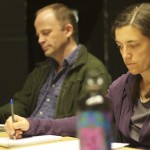Developing Activist Theatre

Whenever I hear a new draft of Re:Union, I am struck anew by the relevance of the questions it asks. The intersection between war, peace, and family, resonates. For a few days at the end of June, the design team, director John Langs, playwright Sean Devine and actors Alexa Devine, Robert Olguin, and Kevin McNulty, gathered around a table to imagine the play in three dimensions on stage at Pacific Theatre. The personal and political converged around the table, as we engaged with the question: how do we choose to act when our conscience prods us to do so?
When I was fifteen, I saw a Fringe play in small town Alberta. I don’t remember the title of the play, but I do remember that it was performed by South African theatre company. It was about apartheid. It changed my life. It made me politically active: I joined Amnesty International, and I started marching in anti-apartheid rallies at the legislature in Edmonton. The end of apartheid, (coincidentally) happened soon after. It made me feel like political change was linked to individuals all over the world acting in concert with their consciences. But what of the activists who lived and died in the long years of struggle before the change?
Norman Morrison self-immolated on the lawn of the Pentagon in 1965 to protest the Vietnam war. As the character Emily Morrison states in the play, the war went on for another ten years. Did his death impact the course of the war? Who can say which actions motivated towards justice have an effect? What is a reasonable time signature to gauge the real link between action and reaction?
My experience with encountering the injustices of the world through theatre convinced me the medium has power, and that the stories we tell have an import beyond creative satisfaction. One of our tasks on the way to production will be to engage with the complexity of these stories, the better to stir a questioning spirit in the creative team, and in our audiences.
Heidi Taylor
Dramaturg
PTC
Comments are closed.
